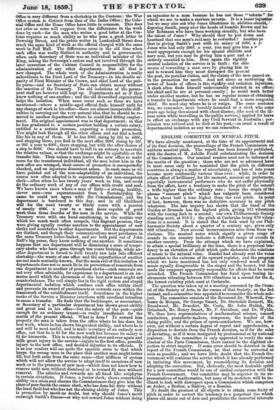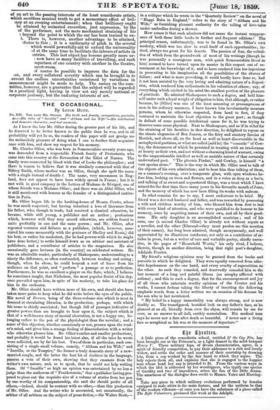ENGLISH COMMITTEE ON MUSICAL PITCH.
Ws have already mentioned, at the time of its a • tment and
of its final decision, the proceedings of the French mission on uniform musical pitch. The report has been formally published, with the decree of M. Achille Fould substantiating the decision of the Commission. Our musical readers need not be informed of the merits of the question ; those who are not so advanced have in most eases only to be reminded that the pitch in different countries is always a matter of uncertainty, and has of late years become more confessedly various than ever ; while, in order to attain effect of brilliancy, for the moment, musical an performers, especially instrumental performers who do not suffer physically from the effort, have a tendency to make the pitch of the concert a trifle higher than the ordinary rate ; hence the origin of the phrase " ooneert pitch " which has vulgarly been considered to be about half a tone higher than the real pitch. In point of fact, however, there was no definitive accuracy in any pitch whatever. The late inquiry has shown that the band of the Guides at Brussels has the highest pitch, giving 911 vibrations with the tuning fork in a second ; our own giving Society standing next, at 9103 ; the pitch at Carlsruhe being 870 vibra- tions in a second. It is stated that the fork used by our Phil- harmonic Society about a quarter of a century ago, gives only 868 vibrations. Now several inconveniences arise from these va- riations. The musical notes which signify a given range n sounds in one country indicate a different range of sounds in another country. From the attempt which we have explained, to attain a special brilliancy at the time, there is a perpetual ten- dency to an elevation of pitch which quite dislocates the relations of music to the natural voice. Handel had already sent the voice somewhat to the extreme of its upward register, and therogress which we have mentioned has not only rendered much of of his music equally disagreeable to the singer and the hearer, but has made the composer apparently responsible for effects that he never intended. The French Commission has fixed upon tuning in- struments vibrating between 870 vibrations in a second for the A, the lowest existing pitch used at Carlsruhe. The question was taken up at a meeting convened by the Conn- oil .of the Society of Arts, in the rooms of that Society, on the 3rd. instant, and a committee was appointed to reconsider the whole sub- ject. The committee ()onside of the Reverend Dr. Whewell, Pro- fessor de Morgan, Sir George Smart, Dr. Sterndale Bennett, Mr. Broadwood, Mr. Benedict, Mr. Costa, Mr. John Huila Mr. Griesbach, Mr. Henry Smart, Mr. F. Davidson, and Dr. Wylde. We thus have representatives of mathematical science, concert conductors, pianoforte-makers, composers, the teacher of the rising public, and the prince of opera-conductors. We see,. how- ever, not without a certain degree of regret and apprehension, a disposition to deviate from the French decision, as if for the sake of deviating, as if it were instigated by professional or by national jealousy. If the committee is only appointed to verify the con- clusion of the Paris Commission, there cannot be the slightest ob- jection to strict inquiry. If some error should be detected in the report of the French Commission, let that error be corrected as soon as possible ; and we have little doubt that the French Go- vernment will continue the service which it has already performed in imitating this movement, by reconsidering its decision and adopting the correction. But, obviously, the most desirable spirit for a new committee would be one of cordial cooperation with the French Government. Our committee may be superior in its re- presentatives of mathematics, but none of its members will be in- clined to look with disrespect upon a Commission which comprises an limber, a Berlioz, a Halevy, or a Rossini. - No doubt the greatest of all objects is to attain some fixity •P4 pitch in order to correct the tendency to a perpetual rise which places old music out of date and prostitutes the immortal interests
of an art to the passing interests of its least considerate artists, which sacrifices musical truth to get a momentary effect of bril- incy at an evening entertainment; when that brilliancy ought be attained by animated execution,just expression, by the of the performer, not the mere mechanical straining of his t beyond the point to which the ear has been trained to ex- t. There is, however, another advantage to be attained, Iferior to this • it is a uniformity of pitch in the several • which would powerfully aid to extend the universality id at the same time to facilitate the labours of artists in entries. This last object has become greatly more nr- ) now have so many facilities of travelling, and such mparison of one country with another in the theatre, ncert-room.
of course be possible to improve the data for the ..en, and every collateral security which can be brought in to ,revent the endless uncertainties occasioned by variations in measurement might be made to help. The names on the com- mittee, however, are a guarantee that the subject will be regarded in a practical light, having in view not any merely national or corporate jealousy, but the enduring interests of art.



































 Previous page
Previous page